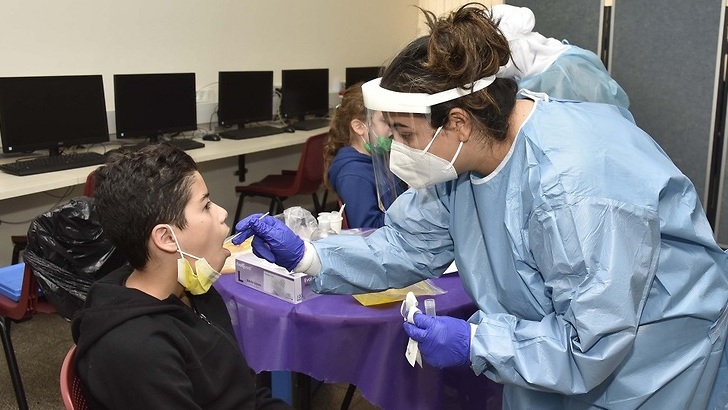With the latest outbreak of coronavirus, the new government is presented with a difficult dilemma and must decide on the correct response to the renewed risk to public health.
Most of the adult population has already received two doses of the Pfizer vaccine, which has been shown to be effective even for the Delta variant - the more contagious mutation that has been spreading around the country and many other parts of the world.
4 View gallery


Israelis around the country return to wearing masks after the latest outbreak of COVID-19
(Photos: Gil Yohanan, Nadav Abas and Barel Efraim)
Health officials, therefore, believe that the unvaccinated population is more susceptible to infection, among them young children who for the most part have not been as seriously ill from COVID-19 as adults.
But recent data shows new infections among the vaccinated population, and those people, some of whom are developing symptoms despite being inoculated, can infect others.
A recent study conducted at Sheba Medical Center, Israel's largest hospital, shows a drop in antibodies in the staff members who were among the first to receive the Pfizer vaccines in December 2020.
Seven months after the launch of the successful vaccination drive, the continued efficacy of vaccines is still not known.
But health officials must not focus on vaccines only. Coronavirus restrictions were lifted over the past few months and Israelis were given the "all clear" to return to their pre-pandemic lives.
This hubris on the part of the previous government, which threw all caution to the wind for purely political reasons, may now cause a reversal of the mitigation that had already been achieved in Israel.
It is impossible to ignore a connection between the end of the mask mandate in classrooms and the recent rise in cases, as Israel's schools are full of unvaccinated children studying in close quarters.
But former health minister Yuli Edelstein opted to remove the indoor mask requirement for the last few weeks of the school year solely so that he could laud his achievements before leaving office.
4 View gallery


Former health minister Yuli Edelstein speaking at an event to celebrate healthcare system's response to coronavirus pandemic, June 2021
(Photo: GPO)
The real damage caused by the policies of the last government will only be seen in the months ahead. After being told that the pandemic had been defeated, Israelis will be less inclined to accept renewed restrictions.
Removing masks was easy, but getting them back onto faces will be a much more challenging task.
Scientists and health experts are unable to agree on the necessary next steps in light of the renewed outbreak. There is little information available about the Delta variant beyond the understanding that it is far more contagious than other known mutants.
Contagion in Israel is widespread and the severity of illness it may cause is still unclear. The calming messaging of some health professionals who say there will not a rise in hospitalizations may be no more than a combination of unproven hypothesis and wishful thinking.
4 View gallery


Cars line up outside a coronavirus testing site that was reopened in Kfar Saba on Saturday
(Photo: Bikoret Bona)
With so much unknown and with the risk to public health and the economy a real concern, It would be wrong to ignore the warnings at least until more data becomes available.
Even if there is no immediate rise in serious illness or death, the ramifications of COVID-19 could cause further stress on the country's health services.
Past experience teaches us that a delay responding to pandemics exacts a heavy price further down the line, and with the disease already spreading, requiring masks indoors is not enough. The government will have to make tough calls and decide on additional steps - for the sake of the wcountry.


